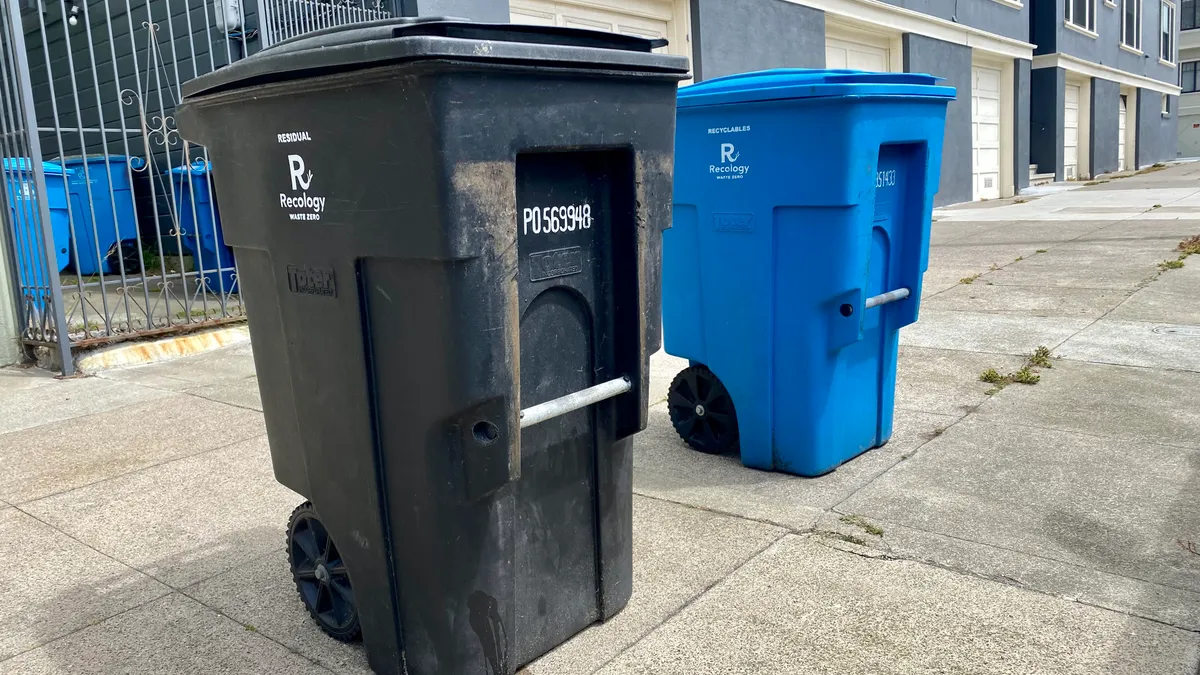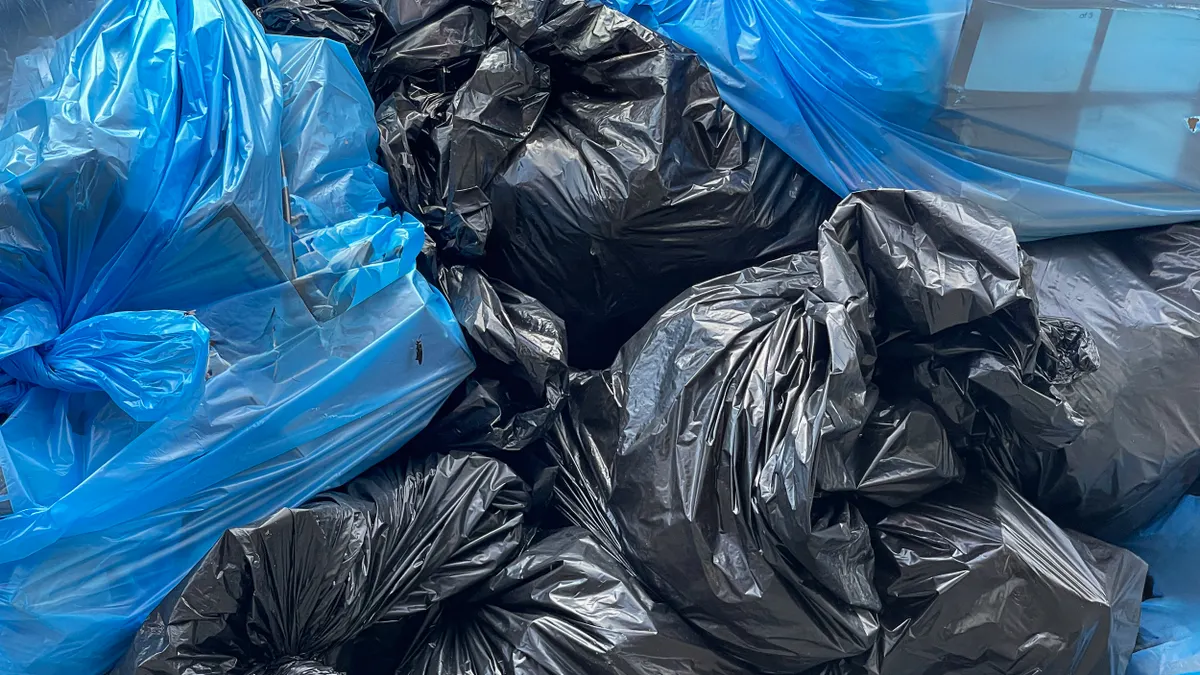As the United States makes strides toward reducing waste and improving recycling infrastructure, Zero Waste USA members see California’s recent legislative session as an example of the notable steps the zero waste movement has taken in recent years — and how far the country still has to go.
Ruth Abbe is the group’s president and a longtime zero waste consultant who works with municipalities to develop zero waste programs and policies. Board member Rick Anthony has served on numerous waste and recycling boards and committees throughout California. Neil Seldman leads the group’s Recycling Cornucopia program and was a co-founder of the Institute for Local Self-Reliance.
The trio talked with Waste Dive just a day after California ended its legislative session, a year where recycling and waste bills contributed to the “most aggressive action on climate change” to date, according to Gov. Gavin Newsom.
They discussed how moves to reduce waste incineration are bubbling up across the country at the same time national conversations about reusable containers are advancing. Meanwhile, high-profile policies like extended producer responsibility — a significant new law California legislators passed this year — play a role in making major recycling improvements, but may not be the most direct way to achieve zero waste.
This conversation has been edited for length and clarity.
WASTE DIVE: What’s your take on how the California legislative session went this year, and how will some of these new laws play into your broader vision for zero waste in the state?
ABBE: This was a very big year. Part of that is just the recognition of the issues around climate change and zero waste initiatives. California has stepped up its regulations over the last 10 years, so there's been a lot of momentum closing in on zero waste from a legislative standpoint even before this year.
A big one this year was AB 1857, which repeals the recycling credit for incinerators. We have two incinerators left in California, and [Zero Waste USA] has a partnership with some of the environmental justice groups that really want to close those incinerators and pursue zero waste. We've been helping them at the grassroots level. This [new law] is not going to necessarily shut down those incinerators, but it showed success from a legislative perspective that we are moving on from incineration and destructive disposal as a primary strategy for managing markets.
SELDMAN: Zero Waste USA is not only working on anti-incineration issues in California, but we are working in other cities like D.C., Baltimore, Minneapolis and Detroit to make this transition from incineration to zero waste. We really are nationwide, even if we have a focus on California.
California also passed a few updates to its bottle bill this year. Other states have also made recent changes to their own container deposit legislation, and there’s talk of a national bill, too. Where does California fit into these larger conversations around container deposit systems?
ABBE: We've had kind of a stalemate in our legislature about how to make a fix to the bottle bill. It's currently one of only two state-run programs, the other one being Hawaii, whereas most of the other ones are run by the distributors and manufacturers or the retailers. It's been a little bit controversial. The recent passage of SB 54 excluded bottle bill materials from its EPR measures, and that was probably a good thing. Adding wine and liquor to the bottle bill [in SB 1013] has also been a good thing.
SELDMAN: There’s talk of a national bottle bill in Congress. For the grassroots folks and zero waste folks, it’s important to add a clause saying that there has to be a minimum amount of bottles to be refillable. This is already a policy of Zero Waste Europe and they’re moving it forward to the European Union. We envision a bill that says 10% of your market share should be refillables by 2026 … with the goal that ultimately, most of our bottles will be refillable, which is the only zero waste option.
You mentioned SB 54, perhaps the most high-profile bill that passed in the state this year. Can you talk about the balancing act policymakers face when deciding who will run EPR programs and how those systems impact the zero waste ecosystem?
SELDMAN: The key question for me on EPR is: who decides? Do we let Coke and Pepsi and their billions decide [how the system is run], or is it the citizens? It's a very interesting debate.
I had a discussion with Kate Bailey with EcoCycle in Colorado. She approves of Colorado’s EPR law as the best approach for the state, which has a 15% recycling rate. Kate explained to me that most state and local officials in Colorado have limited resources and have historically taken a hands-off approach to managing recycling, which is why their EPR law is based on an industry-run system. I respect that. But what about taxing these companies instead and taking the money to build up the capacity, the number of staff, the skill level, the sophistication of state officials, so you'll have competent state and local officials, your public servants, running things instead?
ANTHONY: One thing I learned in San Diego [when working for the Department of Public Works] is that politicians have a four-year life, sometimes eight. Once you train them to understand the bureaucracy, they can do something. But once they’re out, you start over.
ABBE: Many people say the government is incompetent, bureaucratic, corrupt, whatever. But you know, it's the lack of transparency with the private sector that's our biggest concern with the producer responsibility organization type EPR scheme for SB 54.
There are some guardrails in that bill where CalRecycle does have some oversight. A lot of the concerns of the environmental justice community have been heard, too, but there are some big concerns that are left on the table, including chemical recycling not explicitly being excluded, particularly gasification. That's a concern because the chemical recycling supporters are all across the country trying to get that into bills and because we haven't explicitly precluded it in California, it's kind of a big deal.
What lessons do you think California learned this legislative session that other states can learn from as they pursue either their own EPR bill or overall zero waste efforts?
SELDMAN: Zero waste infrastructure is built from local proposals. A key component should be high targets for source reduction and reports and enforcement of those targets. It’s part of a sensible policy that includes other elements and could also include EPR.
ANTHONY: Implementing zero waste across the country, there’s a mix of attitudes [about collection and policy], so it’s tough.
In Southern California, it’s more command and control where cities run the collection system, [residents] put out the bin and collection is complete. In places like Helena, Montana, they all want to recycle, but nobody wants to be told what to do. There’s city collection services, but you can buy private collection for your green material. Back east, a city will do something, a county will do something, the private sector will do something. It's not that they're not offering the same service, but they're not always at the same price, and there are no policies enforcing it, so it can be confusing.
ABBE: The key issue around EPR is that it's an oblique mechanism for getting what you actually want. If you want to figure out how to collect and recycle the last little bit of that unrecyclable thing, that thing should be banned or it should be redesigned. Legislatively, folks have said, ‘EPR is the way to do it. It provides the incentive to the industry to change their product and make it more recyclable.’ In truth, no, it doesn't. Having more recycling is not really the goal. The goal is zero waste.
This story has been updated to clarify details of Colorado's EPR program.



















